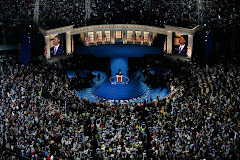As many know I grew up in a traditional Republican family where I was simply a fish out of water and eventually a social outcast. Often my father would deeply describe me as a liberal with all forms of mocking and disrespect. Then a few years ago he read a biography about Franklin Roosevelt and had to admit that for 75 years he was wrong about FDR and that indeed he saved the United State, but still my father would characterize the Democrats in an emotional denegrating way. Then I have a friend, Tom, a college roommate whom I adopted who ebodies in mind and soul the modern conservative personality and worldview. He is unrepentent in holding this totally entrenched view regardless of its outcomes. But knowing these individuals intimately and many others in less closeness I have never come to understand what is really under their skins until today.
Tannehaus opens his essay by saying the obvious;
Today, the situation is much bleaker. After George W. Bush's two terms, conservatives must reckon with the consequences of a presidency that failed, in large part, because of its fervent commitment to movement ideology [emphasis added]: the aggressively unilateralist foreign policy; the blind faith in a deregulated, Wall Street-centric market; the harshly punitive "culture war" waged against liberal "elites."In many ways he sums up the political discourse that has held our society hostage going back to my youth of Nixon. He continues by defining the political framework of 2008-'09:
That these precepts should have found their final, hapless defender in John McCain, who had resisted them for most of his long career, only confirms that movement doctrine retains an inflexible and suffocating grip on the GOPBut what if the conservative soul, what seems to be propelling its irresponsible oppposition to good governance be it managing the economy or faithfully leading our nation internationally. He notes that the soul has not found the admission that possibly it was their movement, their philosophy, their actions from that belief system that might be to blame what is ailing our society?
More telling than Barack Obama's victory is the consensus, steadily building since Election Day, that the nation has sunk--or been plunged--into its darkest economic passage since the Great Depression. And, as Obama pushes boldly ahead, apparently with public support, the right is struggling to reclaim its authority as the voice of opposition.
Yet, even as the right begins to regroup, it is not clear that its leaders have absorbed the full implications of their defeat. They readily concede that the Democrats are in charge and, in Obama, have a leader of rare political skills. Many on the right also admit that the specific failures of the outgoing administration were legion. But what of the verdict issued on movement conservatism itself?Tannehaus then begins to prosecute and expose the conservative movement as being a fraud to itself and therefore allowing me to understand why I could never get a fix on its internals. The author then begins to go deeply poli-sci to prosecute his case of the death the modern conservative movement.
"Of course!" I exclaimed upon hearing and reading this, those who have stolen and co-opted the term conservatism are not anything conservative. This is why the facts continually get in the way like how the Reagan, GHW Bush and GW Bush's Administration grew the deficit and government bigger than any Democratic President and yet the conservatives would rail upon Democratic Big Government. It was smoke and mirrors but why how and why a conservative mind or voter go for this?What conservatives have yet to do is confront the large but inescapable truth that movement conservatism is exhausted and quite possibly dead. And yet they should, because the death of movement politics can only be a boon to the right, since it has been clear for some time the movement is profoundly and defiantly un-conservative--in its ideas, arguments, strategies, and above all its vision. [again emphasis added]
What passes for conservatism today would have been incomprehensible to its originator, Edmund Burke, who, in the late eighteenth century, set forth the principles by which governments might nurture the "organic" unity that bound a people together even in times of revolutionary upheaval. Burke's conservatism was based not on a particular set of ideological principles [more emphasis] but rather on distrust of all ideologies. In his most celebrated writings, his denunciation of the French Revolution and its English champions, Burke did not seek to justify the ancien regime and its many inequities. Nor did he propose a counter-ideology. Instead he warned against the destabilizing perils of revolutionary politics, beginning with its totalizing nostrums. [emphasis added]
In some ways a few years ago I had a drag out argument with my friend Tom over the very definition of liberalism. Defined by Merriam-Webster:
2C: a political philosophy based on belief in progress, the essential goodness of the human race, and the autonomy of the individual and standing for the protection of political and civil rights.Tom maintained in all emotional and intellectual fervor that this was actually the definition of conservatism. Through the never-ending din of an argument I had to physically send him the dictionary definitions to his chagrin and where he still has not paid the bet---typical sore losing conservative I maintain! Merriam-Webster defines conservatism:
2B: a political philosophy based on tradition and social stability, stressing established institutions, and preferring gradual development to abrupt change.Now that is more like it, but as Tannehaus prosecutes the modern conservative movement is nothing like the definition. Instead he writes:
The story of postwar American conservatism is best understood as a continual replay of a single long-standing debate. On one side are those who have upheld the Burkean ideal of replenishing civil society by adjusting to changing conditions. [governing pragmaticism as defined by Burke,---governments were obligated to use their powers to meliorate intolerable conditions.] On the other are those committed to a revanchist counterrevolution, the restoration of America's pre-welfare state ancien regime. And, time and again, the counterrevolutionaries have won. The result is that modern American conservatism has dedicated itself not to fortifying and replenishing civil society but rather to weakening it through a politics of civil warfare.This is more like what I have seen through my fifty plus years, the mindless and committed exercise to weakening society through civil warfare---AKA the CULTURAL WARS. This war has been waged throughout every vessel in our society; in homes, schools, workplace, entertainment, TV, churches, organizations and even sports. I personally witnessed how a righting neo-conservative, Michael Ledeen, who attempted to use the firing of my friend and Hall of Fame coach, Bob Knight at Indiana University as a stage to write an essay that Knight was fired for cultural political reasons and not because of internal IU politics. Both Bob and I found it shameful and a complete manipulation of the entire event. But Ledeen was serious, the same way Ledeen was personally serious to me in attempting to sell the Iraq War. Everything seemed to be framed by this cultural war and that was because of the modern conservative movement.
Tannehaus continues his prosecution:
One reason is that the most intellectually sophisticated founders of postwar conservatism were in many instances ex-Marxists, who moved from left to right but remained persuaded that they were living in revolutionary times and so retained their absolutist fervor. In place of the Marxist dialectic they formulated a Manichaean politics of good and evil, still with us today, and their strategy was to build a movement based on organizing cultural antagonisms. Many have observed that movement politics most clearly defines itself not by what it yearns to conserve but by what it longs to destroy--"statist" social programs; "socialized medicine"; "big labor"; "activist" Supreme Court justices, the "media elite"; "tenured radicals" on university faculties; "experts" in and out of government.To any political scientist this an obvious backward thinking philisophy. Any genuine student of history understands that in all reality a trend towards government reliance in the economy and society was a function of basic political pragmaticism with the unstoppable rise of industrial capitalism and its extraordinary advances of the new technologies capitialism created. But it appears the conservative soul is stuck in pre-New Deal thought. Is that why GW Bush thought his reelection political capital gave him permission to pursue the privatization of Social Security, that even he admitted was a mistake?
But, if it's clear what the right is against, what exactly has it been for? This question has haunted the movement from its inception in the 1950s, when its principal objective was to undo the New Deal and reinstate the laissez-faire Republicanism of the 1920s.
But the modern state is complex where liberal or conservative, activist goverance is about guarding the interests and needs of the entire population, not just a political or socio-economic class. But how does this reconcile with reality when one leaves scholarly discussions of rhetoric when the political discourse faces actual issues of social policy. Modern conservatives tend quietly to forget the ideas of nurturing the "organic" unity and adopting the views of the American business community. as in denouncing things like federally sponsored school lunch programs as a "vehicle for totalitarianism" or Social Security as a form of "remorseless collectivism"----errr the cannon shots of the civil warfare.
Tannehaus then proposes that:
For years to come, this paradox would roil the right, which remained split between the Burkean politics of realistic adjustment and the revanchist politics of counterrevolution.He then takes us through a long course of conservative politics from the 1950's to Nixon and finally to Reagan. First he holds that there was an intellectual revolution after Goldwater's huge defeat reaching its peak in 1975. He then holds to liberalism's failures:
As liberals unwittingly squeezed themselves into the stereotypes conservatives had invented, conservative intellectuals began to look like prophets for identifying a self-appointed "managerial elite" (Burnham's term from 1941) that was leading a "liberal revolution"....He then broaches the subject that even invaded the current Presidential race, Vietnam, Watergate and Nixon.
...This liberal overreach combined with the right's new sophistication promised a new period in U.S. politics, one in which conservatives, fortified by Burkean principles, might emerge as the most articulate voices of "civil society," separating out the strands of true reform, which drew on inherited values, from "liberal-left" attempts to make those values extinct. Perhaps the Great Society could be retooled, tamed into a legitimate extension of the New Deal. But, to accomplish this, the right would have to deal honestly with capitalism and its many ambiguities.
In retrospect, two horrific events, Vietnam and Watergate, crowd out all other memories of the early 1970s. But the decade began with the promise of a mature conservatism. Richard Nixon, who took office as a credentialed anticommunist, had the authority to orchestrate a quick end to the Vietnam war, something voters clearly wantedAh Nixon and the real enemy, the dark liberal forces that we heard bantered about for thirty years. Not that Nixon was acting unconstitutionally or criminally but somehow the victims made him do it along with the liberal-left media! Remember this is revenge politics bent on weakening society not strengthening it.
...Of course it didn't happen. Why not? A big reason was Nixon himself. Rather than reconciling the two strains of conservatism, he played them against each other, sometimes strategically, sometimes cynically, sometimes paranoically, always chaotically.
...The polarization climaxed with Watergate. That cluster of White House crimes, once uncovered and prosecuted, gave conservatives the ideal occasion to reassert their role as guardians of social order. It was, after all, conservatives--most notably Burnham in Congress and the American Tradition--who had been inveighing for years against the destabilizing dangers of overreaching "Caesarist" presidents. Burnham was incensed when Nixon invoked "executive privilege" to evade congressional inquiry into "[t]he shoddy little trail of this pipsqueak Watergate business."
But the new generation of movement intellectuals interpreted Watergate differently. Just as liberals suspicious of Bill Clinton rallied around him during his impeachment, so Nixon's critics on the right defended him during Watergate. The true culprit, they decided, wasn't Nixon. It was the dark liberal forces arrayed against him. A "long term change in the equation of political power," Jeffrey Hart theorized in National Review, had placed the president at the mercy of "the federal bureaucracy," which, "though nominally part of the 'executive branch,' actually operates with considerable autonomy." But this "long term" change appeared to have happened overnight, with the election of the first president who had ties to the right. Hart also identified a second culprit, the "liberal-left bias of the major media."
The argument that political power emanated from an alliance of liberal government bureaucrats and a sympathetic press became the favored theme in the movement's next phase...The battle lines of the cultural war beginning with Reagan's Revolution, Ronald Reagan, its denunciations of "big government" and "welfare queens" supported the devotion ( to supply-side economics, known in another era as the Horse and Sparrow Economics, meaning if the horse ate enough oats, the sparrow had enough manure to get some food.
...The attack on the "new class," rooted in cultural hostility, dominated movement conservatism for the next 30 years, up through the administration of George W. Bush. On one side, as Rusher described it, were "businessmen, manufacturers, hard-hats, blue-collar workers, and farmers." On the other: "a liberal verbalist elite (the dominant media, the major foundations and research institutions, the educational establishment, the federal and state bureaucracies) and a semipermanent welfare constituency."
With Reagan, the argument between realism and revanchism all but ended. The revanchists had won. They consolidated their power during the 1990s when Republicans spent the better part of Bill Clinton's two terms trying to delegitimize him, even as he collaborated with them "to end welfare as we know it."Thus Tannehaus concludes his prosecution that Conservatism is Dead because it never was conservative and about a political philosophy bent on revenge and attempting to build a past ideology eventually with no regards to governments were obligated to use their powers to meliorate intolerable conditions or nurture the "organic" unity. Thus the Republican Party is not really conservative--in its ideas, arguments, strategies, and above all its vision, it is a defunct counterrevolutionary force that screwed up our society.
...The right, which for so long had deplored the politics of "class warfare," had become the most adept practitioners of that same politics. They had not only abandoned Burke. They had become inverse Marxists, placing loyalty to the movement--the Reagan Revolution--above their civic responsibilities.
...Though, inevitably, most conservatives vote Republican, they are not party loyalists and the party has to woo them to win votes. This movement is issue oriented. It will happily meld with the Republican party if the party is 'right' on the issues; if not, it will walk away." By this calculus, all the obligations flow in only one direction. Parties are accountable to movement purists, while purists incur no reciprocal debt. They determine the "right" position, and the party's job is to advance it.
...By their lights, they are right to do so. Bush, so often labeled a traitor to conservative principles, was in fact more steadfastly devoted to them than any of his Republican predecessors--including Ronald Reagan....At his peak, following September 11, Bush commanded the loyalties of every major faction of the Republican Party. The big central domestic proposal of his first term, the $1.3 trillion tax cut, extended Reagan's massive "tax reform" from the 1980s. Shortly before the Iraq invasion, Martin Anderson, Reagan's top domestic policy adviser, told Bill Keller (writing in The New York Times Magazine) that Bush was unmistakably Reagan's heir. "On taxes, on education, it was the same. On Social Security, Bush's position was exactly what Reagan always wanted and talked about in the '70s," Anderson said. "I just can't think of any major policy issue on which Bush was different." The prime initiative of Bush's second term, the attempt to privatize Social Security, drew directly on movement scripture:
...And then there was Iraq, the event that shaped Bush's presidency and, by most accounts, brought both him and the movement to ruin. It was also the event most at odds with classic conservative thinking. It is customary even now to say that the architects of the Iraq occupation failed because they naively placed too much faith in democracy. In fact, the problem was just the opposite. So contemptuous of the actual requirements of civil society at home, Bush's war planners gave no serious thought to how difficult it might be to create such a society in a distant land with a vastly different history. Those within the administration who tried to make this case were marginalized or removed from power.








No comments:
Post a Comment